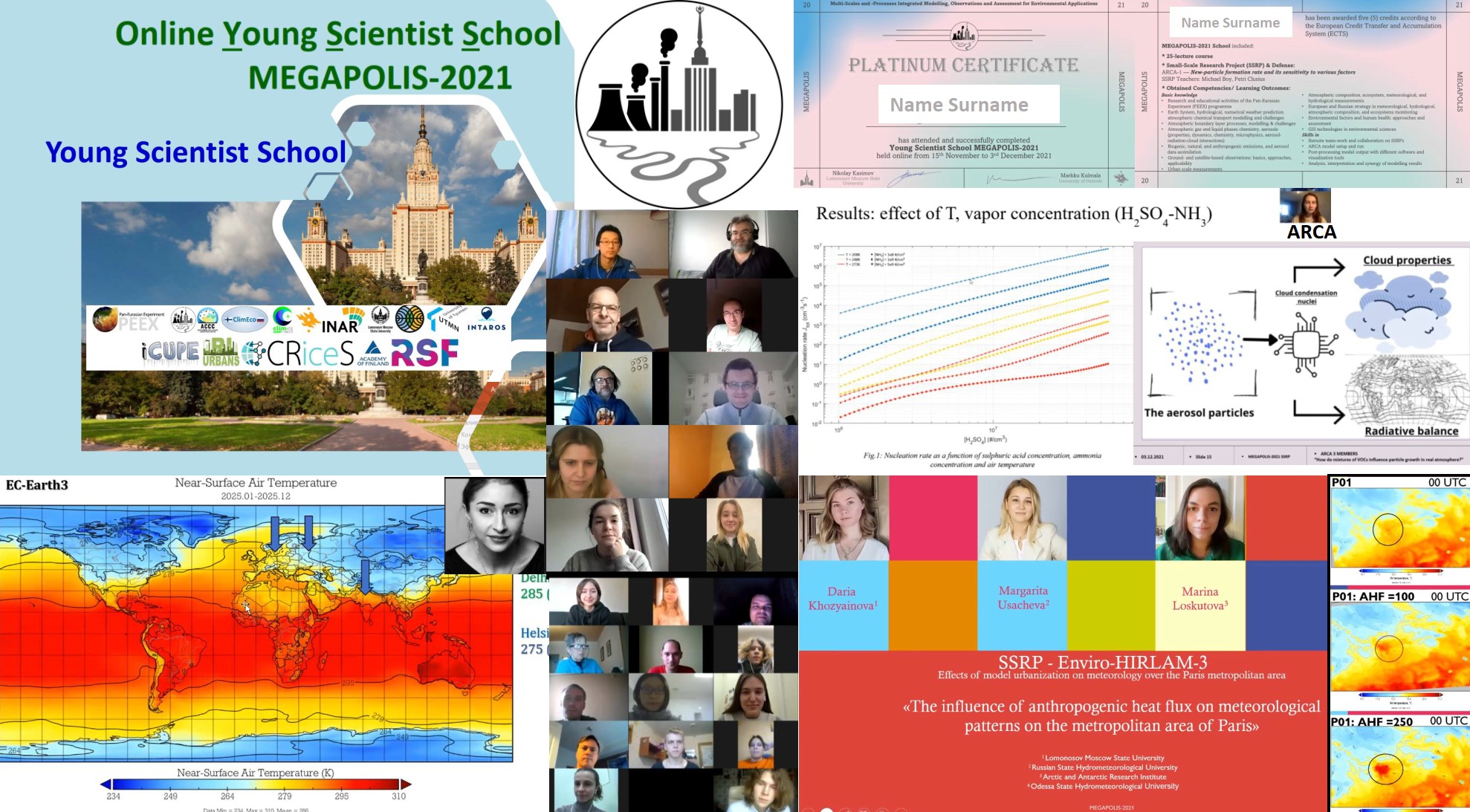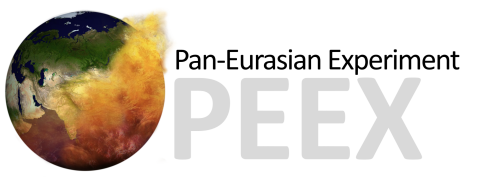Project Description

The Young Scientist School (YSS) MEGAPOLIS-2021 (https://megapolis2021.ru) on “Multi-Scales and -Processes Integrated Modelling, Observations and Assessment for Environmental Applications” in Memory of Professor Sergej Zilitinkevich (1936-2021) took place online during 15 November – 3 December 2021. Sergej Zilitinkevich was one the key organizers of the School, promoting for research community, and especially, for the younger generation, the importance of atmospheric and environmental sciences, approaches in the Earth system modelling and their applications.
The MEGAPOLIS-2021 YSS introduced young generation of researchers to special topics in atmospheric and environmental sciences, Earth system modelling approaches and applications, especially considering transport and fate of small (micro) particles. During the school, participants learnt about the current progress and challenges in Earth system research; meteorological, hydrological and atmospheric composition modelling and observations (including ground-based and remote-sensing); and modern technologies for environmental studies and assessments (including health impacts). The programme consisted of theoretical lectures and practical exercises, which were accomplished by groups/teams of students as small-scale research project (SSRPs).
More than 50 young researchers (advanced BSc, MSc and PhD students as well as PostDocs) from 22 Universities and research organizations/ institutions from Russia, China, Austria, Ethiopia, Switzerland, Ukraine, and UK participated in the School. The YSS programme included a series of online lectures (24 in total), remote work by students in groups (up to 5 persons in each group) on SSRPs, followed by final presentation/ defence of the completed SSRP.
At start (during 15-19 November), a series of lectures was delivered online by 22 researchers from Finland (University of Helsinki, Institute for Atmospheric and Earth System Research, Finnish Meteorological Institute), Norway (Nansen Environmental and Remote Sensing Center), Russia (Moscow State University, Russian State Hydrometeorological University), Switzerland (World Meteorological Organization), and USA (National Oceanic and Atmospheric Administration, Northeastern University). In total, more than 80 persons attended the online lecturing period. The lectures included – the introduction into the PEEX programme and its research and educational activities, the Finnish Flagship – Atmosphere and Climate Competence Center as well as the Earth System, hydrological, numerical weather prediction and atmospheric chemical transport modelling and their specific challenges. On the 2nd day, the lectures included themes of the seamless online integrated modelling, process-based modelling for meteorology-chemistry-aerosol system and specific challenges; atmospheric boundary layer processes, modelling and challenges; atmospheric gas and liquid phases chemistry; aerosol properties, dynamics, chemistry and microphysics. On the 3rd day, the following topics were covered – aerosol-cloud radiation interactions; biogenic, natural, and anthropogenic emissions; aerosol data assimilation; ground-based observations – basics, approaches, applicability. The last 2 days included online lectures on the remote sensing observations – basics, approaches, applicability; SMEAR atmospheric composition and ecosystem measurements; European and Russian strategies in meteorological, hydrological, atmospheric composition and ecosystems monitoring; meteorological and hydrological measurements; urban scale measurements; environmental factors and human health – approaches and assessment; and GIS technologies in environmental sciences.
During 19 November – 2 December, the YSS participants worked remotely in Groups/Teams on small-scale research projects (SSRPs; https://megapolis2021.ru/ssrp) connected with the ARCA-Box (Atmospherically Relevant Chemistry and Aerosol Box Model), Enviro-HIRLAM (Environment – High Resolution Limited Area Model), and EC-Earth models. The main learning outcomes included obtained basic knowledge on lectures’ themes/ topics and obtained competencies including skills the models setup and run, remote team-work and collaboration on SSRPs, post-processing model output with different software and visualization tools; and analysis, interpretation and synergy of modelling results. Remote work in groups also included bi-weekly online (zoom) consulting by 8 teachers on SSRPs from Finland, Denmark, Russia, and Ukraine.
Finally, on 3rd December, the presentations on SSRPs were delivered by groups of students. The successfully defended SSRPs included: “New-particle formation rate and its sensitivity to various factors”, “How do emissions and oxidizing capacity affect particle growth rate?“ and “How do mixtures of VOCs influence particle growth in real atmosphere?” – with the ARCA-Box model; “Effects of model resolution on meteorology and pollution dispersion over the Kola Peninsula”, “The influence of anthropogenic heat flux on meteorological patterns on the metropolitan area of Paris” and “The influence of black carbon and mass concentration of dust on meteorological parameters” – with the Enviro-HIRLAM model; and “Study of near-surface air temperature in Moscow in various future scenarios” – with the EC-Earth model
Following results of the overall evaluation (3 components: online lectures + remote work in groups on SSRPs + final presentations/ defence of SSRP), the participants successfully completed YSS were awarded the MEGAPOLIS-2021 Platinum, Gold or Ordinary Certificates as well as the Certificates of Attendance (for participants whom attended only the lectures).
All materials of the MEGAPOLIS-2021 YSS are available at: https://megapolis2021.ru
Text by Sergey Chalov, Anatolii Tsyplenkov (Moscow State University), Alexander Mahura (University of Helsinki)
